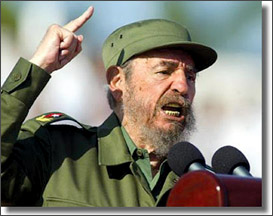Judge throws out charges against anti-Castro militant
 Anti-Castro
Cuban militant Luis Posada Carriles cleared of charges Tuesday Anti-Castro
Cuban militant Luis Posada Carriles cleared of charges Tuesday
Posada was facing seven counts of immigration fraud
Cuban government blasts decision; calls Posada "bin Laden of the
hemisphere"
Judge says tactics leading to charges violated "the universal sense
of justice"
A federal judge dropped charges against former CIA operative and
anti-Castro Cuban militant Luis Posada Carriles on Tuesday, blasting
what she called government "fraud, deceit and trickery" in an interview
with Posada that led to the charges.
Posada, 79, was charged with seven counts of immigration fraud. He
was arrested in Miami in May 2005 after entering the country illegally.
U.S. district judge Kathleen Cardone ordered Posada's electronic
bracelet cut off in the courtroom Tuesday and cleared the way for him to
return to Miami a free man.
Posada's attorney, Arturo Hernandez, told CNN the ruling was "an
incredible legal victory."
The Justice Department and the Department of Homeland Security said
they were reviewing Cardone's decision. Cuba, Venezuela want Posada to
face charges The Cuban government reacted angrily to news of Posada's
release, calling him a "known terrorist" in a statement released by
Dagoberto Rodriguez Barrera, chief of the Cuban Interest Section in
Washington.
In the statement, the Cuban government blames the White House for
having "made all the efforts necessary to protect the bin Laden of the
hemisphere, [out of] fear that he could have talked and recount the
whole history about the U.S. government links with his terrorists'
activities."
The Cuban government accuses Posada of being involved in the 1976
downing of a Cuban passenger plane, which killed 73 people. Posada has
denied any role in the airliner attack.
He's also accused of being involved in a string of hotel bombings in
Havana and making attempts on the life of Cuban leader Fidel Castro.
Venezuela and Cuba have both asked that Posada be extradited, but an
immigration judge in September 2005 ruled he could not be sent to either
country out of concern he might face torture there.
Posada's presence in the United States presented a problem for U.S.
officials, who want to support anti-Castro Cubans but were sensitive to
terrorist charges against Posada.
"As with each and every defendant who comes before this court,
defendant in this case is entitled to certain rights under the United
States Constitution," Cardone wrote in her 38-page ruling. "This court
will not set aside such rights nor overlook government misconduct
because defendant is a political hot potato. This court's concern is not
politics, it is the preservation of criminal justice."
Judge condemns government's 'manipulation' Cardone threw out the
interview with immigration authorities that was the basis of the charges
against Posada. The interview was poorly translated for him, she found,
and "No effective communication existed between defendant and the
interviewers."
"In light of the fact that the indictment in this case is based upon
statements made during the naturalization interview, this court finds
that the interpretation is so inaccurate as to render it unreliable as
evidence of defendant's actual statements," she wrote.
In addition, Cardone condemned what she called government
manipulation in the case, noting that Posada's naturalization interview
was unusual in that it stretched eight hours over two days, as opposed
to the usual maximum of 30 minutes.
Cardone called the interview a "pretext for a criminal
investigation." Although "warnings" were provided to Posada at the
beginning of the interview, she wrote, they were read to him in English
without any translation, and his attorney continually was told that if
Posada exercised his Fifth Amendment right against self-incrimination,
it would result in termination of the interview.
"More importantly," she wrote, "defendant did not receive an
explanation of the true import of the government's inquiry."
The "defendant had few options, and the government took advantage of
his situation and manipulated it to serve its own ends," she wrote. She
said the mere fact that he was questioned about bombings "belies the
argument that this was a routine naturalization interview."
Government 'violated universal sense of justice'
"This court finds the government's tactics in this case are so
grossly shocking and so outrageous as to violate the universal sense of
justice," Cardone wrote. "As a result, this court is left with no choice
but to dismiss the indictment.
"Posada was jailed for nine years in Venezuela in connection with the
airliner attack, but was never convicted and escaped in 1985. In Panama,
he was convicted of plotting with three Cuban exiles to kill Castro
while the leader was visiting Panama in 2000. He later received a
presidential pardon and surfaced in Guatemala and Mexico before heading
to the United States.
He has said he was smuggled over the Mexican border into Texas and
came by bus to South Florida. However, the government argued that his
longtime friend and benefactor, Santiago Alvarez, smuggled him into the
country on his fishing boat. Alvarez is currently jailed on unrelated
weapons charges.
Posada received CIA training in explosives and sabotage at Fort
Benning, Georgia, after he helped organize the failed Bay of Pigs
operation to oust Castro in 1961. He has said he stopped working for the
CIA in 1968, but in the 1980s helped the U.S.-based secret Contra supply
network in Central America.
After his U.S. arrest, Posada was held in a New Mexico jail. He
posted $350,000 bond last month, prompting outrage from Venezuela and
other countries.
CNN
|
